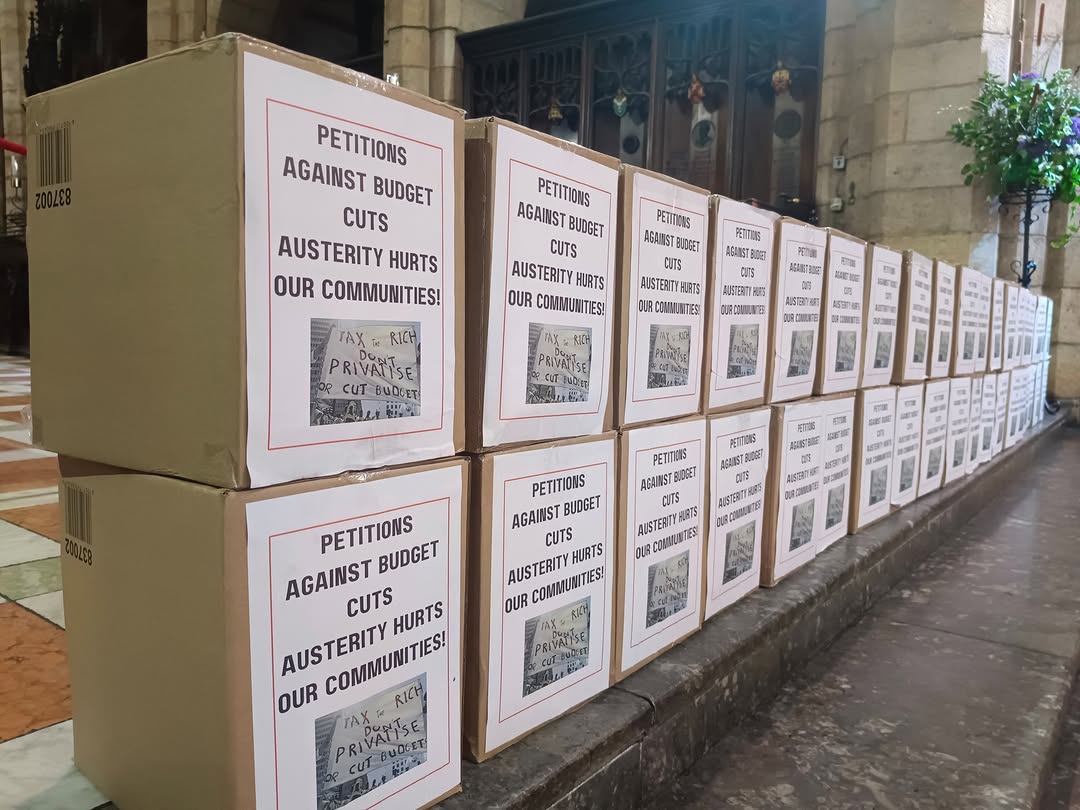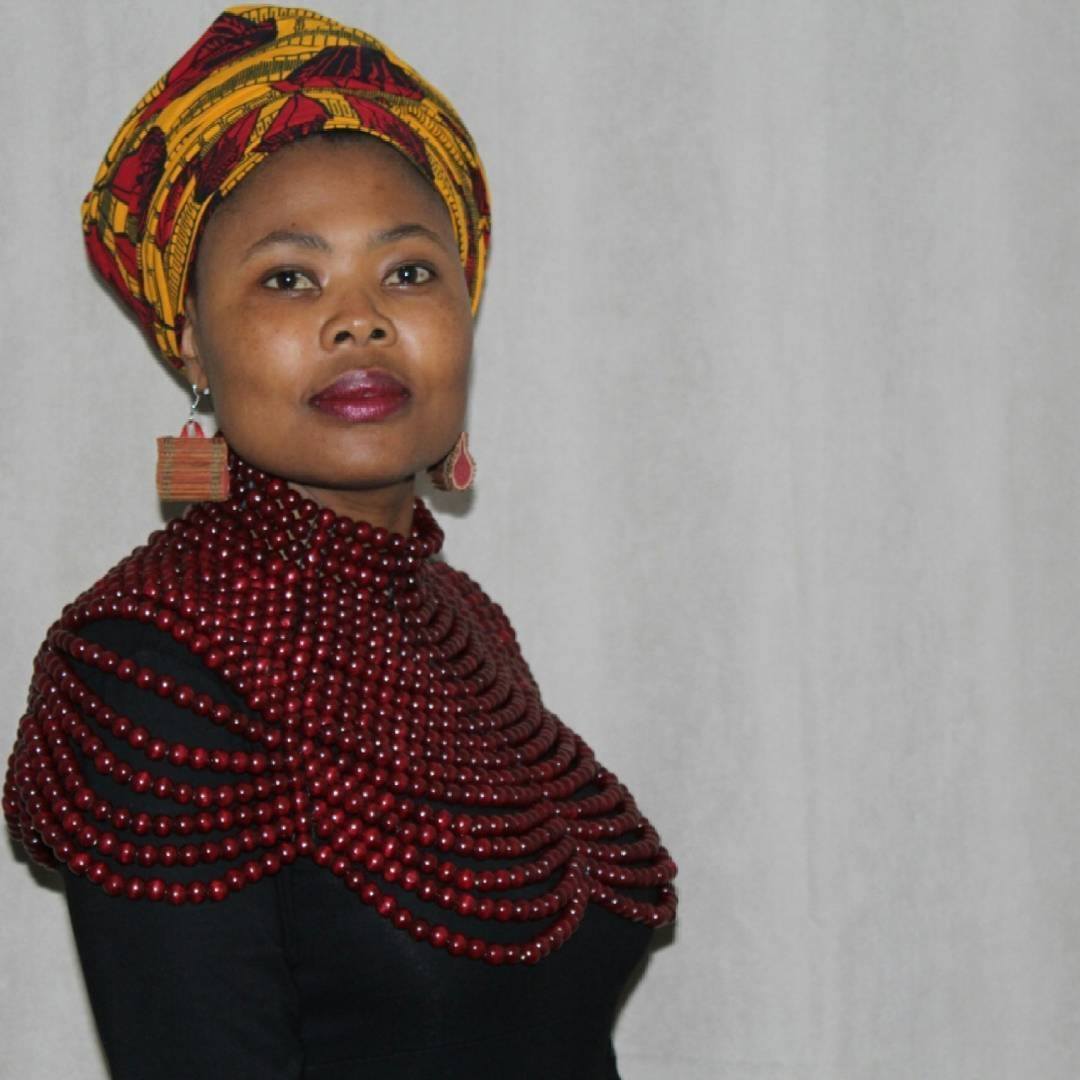

Busisiwe Mtabane
Busi is the Media Liaison Officer at the Alternative Information & Development Centre in South Africa, and works closely with the Cry of the Xcluded movement.
By Busisiwe Mtabane
The text is an edited version that was originally published on the AIDC website. Video from event is found below.
Earlier this year activists, grassroots leaders, and concerned citizens joined the “People’s Budget Assembly” to demand an end to the austerity measures that have been wreaking havoc on their communities.
The event, held on the eve of the Budget that never was, was a rallying point for those who believe that the government’s economic policies are pushing South Africa’s most vulnerable people further into poverty and inequality.
The assembly, held in the historic St George’s Cathedral, known as “The People’s Cathedral”, brought together a diverse coalition of voices from trade union members to social justice organisations, youth activists, and local community leaders.
What united them was a common purpose: to advocate for an economic system that prioritises the needs of ordinary people over the interests of the elites. In their sights was the national budget, which many see as a reflection of South Africa’s political and economic priorities.
The human costs of austerity
Austerity measures are typically introduced in response to economic crises, where governments make spending cuts and reduce public services to try to balance national budgets. In South Africa, these policies have led to job cuts, reduced social spending, and a wage freeze for public sector workers. Meanwhile, essential services like healthcare, education, and housing continue to be underfunded, leaving communities struggling to meet their basic needs.
At the assembly, speakers emphasised how these austerity measures disproportionately affect the poor, the working class, and marginalised groups. For many, the constant tightening of belts has translated into higher costs of living, reduced access to social services, and an overall sense of abandonment by the state. According to Professor Lydia Cairncross from the People’s Health Movement South Africa, in 2023/24, this country experienced the most severe cuts in the health budget since 1994. She said, “When politicians say ‘we are cutting the health budget’, what they’re saying is that ‘we are cutting your lives’. That’s what it means in healthcare.”
Solly Mapaila, SACP General Secretary, said neoliberalism, which gives us these budget cuts, is a form of violence against the people, and that’s what the government must be told. At the same time, SAFTU General Secretary Zwelinzima Vavi called for unity amongst workers, students and communities to form a formidable movement against austerity, privatisation and systemic injustice. “We are told by those in power that there is no money. There’s no money for public welfare, yet funds are readily available for corporate bailouts and the luxuries of the elites. This glaring contradiction exposes the true priorities of a system designed to serve the interest of a privileged few at the expense of the many,” he remarked.
People before profit
South African youth continue to bear the burden of unemployment. “We all know a young person who does not work; we all know a young person who cannot get funding into university or find space. We are calling for a budget that prioritises the people but particularly prioritises the biggest population group of this country, which is young people,” said Nape Senong, Mobiliser Strategist at Youth Capital.
The rallying cry at the assembly was clear: the South African government must prioritise people, not profit. “The People Against Budget Cuts”, a coalition of civil society organisations, trade unions, and community groups, calls on the government to rethink its budget allocations and ensure that economic policies work for the people, not just the elites.
Key demands include:
- The government must take immediate steps to control and reduce prices of basic commodities like food, fuel, and electricity.
- Provide more resources for safety, security and rehabilitation, including emergency response and community safety, but also proper oversight over policing and security programs.
- End austerity policies that disproportionately affect women and worsen the conditions that lead to GBV.
- Provide funding for the filling of vacancies in public services, in particular schools, hospitals and clinics on a full-time basis within this year.Government to stop land dispossession and redistribute land to build decent housing and undo the legacy of apartheid.
- The South African Reserve Bank must change its mandate to support economic growth and increase employment instead of just increasing interest rates for the benefit of loan sharks and foreign lenders.
Building power from below
The People’s Budget Assembly was not just about demands; it was about building power from the ground up.
The assembly highlighted successful grassroots organising efforts from across the country with a clear message that the government must listen to the people most affected by its policies. “We are the ones living the reality of austerity,” said Vuyokazi Made, Cry of the Xcluded leader from Gqeberha in the Eastern Cape.
The climax of the evening was the over 100,000 anti-austerity petitions collected in 6 provinces demanding an end to austerity measures.
Made congratulated the comrades who had collected signatures for the anti-austerity petition. “This process assisted us as civil society organisations; it gave us a chance to build our organisations, we also interacted with communities, and we now better understand the struggles of the working class”.
“This process assisted us as civil society organisations; it gave us a chance to build our organisations, we also interacted with communities, and we now better understand the struggles of the working class”.
Vuyokazi Made, Cry of the Xcluded leader
from Gqeberha in the Eastern Cape.
The road ahead
As the assembly drew to a close, there was a renewed sense of hope among participants. While the challenges are immense, the gathering reminded everyone present that change is possible when people unite and demand justice. The call for a people’s budget wasn’t just about resisting austerity, it was about creating a future where all South Africans can live with dignity, access to quality public services, and economic opportunities.
The people were not discouraged by the fact that the Treasury officials did not honour the invitation to receive the petitions. The following day, they successfully marched to Parliament just a few hours before Finance Minister Enoch Godongwana announced the postponement of the Budget Speech.
In the coming weeks, the People Against Budget Cuts Campaign will continue to advocate for these demands in Parliament and beyond, pushing for a shift in government priorities. The assembly was just the beginning of what organisers hope will be a broader movement for economic justice in South Africa.
For now, the voices of the People’s Budget Assembly and the march against austerity echo across the country, a powerful reminder that the struggle for a just and equitable South Africa is far from over. It’s time to bring our voices to the table and demand the resources we need to thrive. You can also join the call by signing the online petition here and watch the assembly here.
